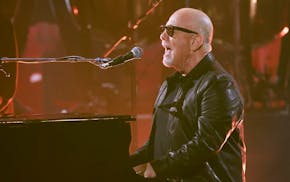I'm psyched about synchronized swimming. Admittedly, I can't name a single athlete, have no clue about the rules and, forced to participate, would probably get a cramp in 3.2 seconds flat. But it's Olympics season, which means that for the next 17 days, Americans will turn their attention to badminton, rowing, taekwondo and a dozen other sports that normally wouldn't merit time on ESPN17.
It all starts tonight with an opening ceremony produced by Chinese auteur Yimou Zhang ("House of the Flying Daggers") with 15,000 performers and an audience that includes President Bush, Russian Prime Minister Vladimir Putin and Chinese President Hu Jintao all sharing the same box of popcorn.
And that's just the beginning.
NBC and its sister stations, including MSNBC, CNBC, Oxygen, Telemundo and USA, will provide 3,600 hours of coverage on TV and online, more time than all the previous summer games. Combined.
That number seems as outrageous as a gold-medal win for Pakistan's basketball team, but NBC Sports President Dick Ebersol believes the time is right for our country's most contagious case of Olympic fever.
"It isn't exactly a joyous time in America right now, with $4 gas prices, people who can't afford vacations, wild prices on food and so forth," he told TV critics at their summer press tour. "People are really looking for something to cheer for, and these athletes certainly offer that."
Ebersol believes that sports are filling a gap in the TV-drama department, still staggering from the writers' strike. He points to record-setting numbers for the Super Bowl, the huge response to the recent Wimbledon final and high interest in anything attached to Tiger Woods.
Adding to the excitement, at least half of the prime-time coverage will be presented live, a coup considering there's a 13-hour time difference between Beijing and Burnsville. Credit Ebersol -- and the still-powerful American dollar.
Back in 2001, Ebersol told Olympics chief Jacques Rogge that network TV would be less willing to bid for future games in the Far East if there weren't enough opportunities for "live" coverage at a reasonable hour. Well aware that the United States generates more than half of all Olympics revenue, Rogge agreed to hold important finals in the morning, though no earlier than 10 a.m., giving athletes time to rub the sleep out of their eyes and digest a bowl of Wheaties.
The result: Some of the most popular sports, including basketball, gymnastics and volleyball, will be shown live around the same time you're used to watching Jay Leno.
Keeping with the all-sports, all-the-time philosophy, the network is also paring the number of "touching" athlete profiles, a device used so often at past Olympics that it often looked more like a Barbara Walters special.
All high-def, all the time
With the emphasis on action, viewers with high-definition TV will get their money's worth. For the first time, 100 percent of the coverage will be in HD, which means fans can see the sweat drop off Kobe Bryant. That's a big jump from the Athens games, in which only five events, plus the opening and closing ceremonies, were shot in HD.
Of course, you don't need a fancy TV to enjoy the Olympics. In fact, you don't need a TV at all.
Online will play a huge role as will bloggers like KARE's Eric Perkins, who will put an emphasis on Minnesota athletes.
"I've been issued a Blackberry, so I'll be blogging while sitting in the cab or on the shuttle," said Perkins, who is covering his third Olympics and produced one of the nation's most popular blogs at the previous winter games. "I'll constantly be asking myself, 'What kind of information can I give from the ground? What peeks can I provide behind the scenes?' It's going to be very fly-by-the-seat-of-the-pants, completely unabashed and raw."
Of course, all the bloggers, TV executives and technological wizards will take a back seat to the game's real stars: the 10,000 athletes. In the end, their stories and strength will determine just how many of those 3,600 hours we'll watch.
"It's once every four years, which means for many of those competitors, it's once in a lifetime," said main anchor Bob Costas, covering his eighth Olympics. "Think of the drama involved in preparing your entire life and then intensely for several years prior to your event, some of which last 10 seconds or less and that will define you for your career. I think that raises the stakes and that's why so many people around the world, Americans included, pay close attention."
njustin@startribune.com • 612-673-7431

Neal Justin: Why Conan O'Brien is a national treasure

TV review: 'Jane' is the best heroine for families prepping for Earth Day

CBS will turn the lights back on for Billy Joel concert

TV to watch: Billy Joel offers concert for those of us who aren't big shots

